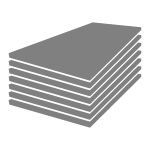Alloy 600 / UNS N06600 / W.Nr. 2.4816
Description
Alloy 600 is a nickel-chromium-iron, solid solution strengthened alloy used for applications that require corrosion and elevated temperature resistance. Service temperatures for alloy 600 can be from cryogenic to 2000°F. This alloy also has good workability, weldability and high strength.
Industries and Applications
The unique properties of alloy 600 make it useful in various applications across several industries. Chemical process industry applications include heaters, condensers and trays. Heat-treat industry applications include muffles, retorts, baskets and other furnace fixtures. Aerospace industry applications include exhaust liners, turbine seals and air-frame components. Alloy 600 is also used in the nuclear industry because of its resistance to corrosion in high purity water.
Resistance to Corrosion
With 72% minimum nickel, this alloy is resistant to many organic and inorganic compounds and also offers good corrosion resistance in reducing conditions. The high nickel content lowers the chances for stress corrosion cracking for this alloy in the annealed condition. The high nickel content also improves resistance to carburizing, nitriding and thermal fatigue, while maintaining an austenitic structure so it retains ductility. Increased chromium in the alloy offers high temperature resistance to sulfur compounds as well as resistance to oxidizing compounds at elevated temperatures or in corrosive media. Alloy 600 has excellent resistance to alkalies and is one of the few materials suitable for use in strong solutions of magnesium chloride at elevated temperatures. Typical corrosion in MgCl₂ is roughly 1 mpy. When applicable, material for severe service should be fully stress relieved prior to use.
Fabrication and Heat Treatment
Alloy 600 can be hot or cold formed using typical processes. Hot working should be performed between 1600°F and 2250°F, avoiding any work between 1200°F and 1600°F as the ductility decreases in this temperature range. The cold work hardening rate is less than 304 stainless steel yet higher than mild steel. Welding alloy 600 can be achieved via shielded metal-arc welding using AWS ENiCrFe-3 electrode. Filler metal AWS ERNiCr-3 can be used when TIG and MIG welding. Alloy 600 is slightly more machinable compared to 304 stainless steel and should be performed with tooling large enough to handle the loads. Alloy 600 machining requires heavy-duty equipment along with sharp tooling and proper cutting fluids. Annealing of alloy 600 without excessive grain growth can be performed at 1850°F for 15 minutes at temperature. Fine grain material typically has better corrosion resistance and higher tensile, fatigue and impact properties.
Common Trade Names
INCONEL® alloy 600
INCONEL® is a registered trademark of the Special Metals Corporation group of companies.











